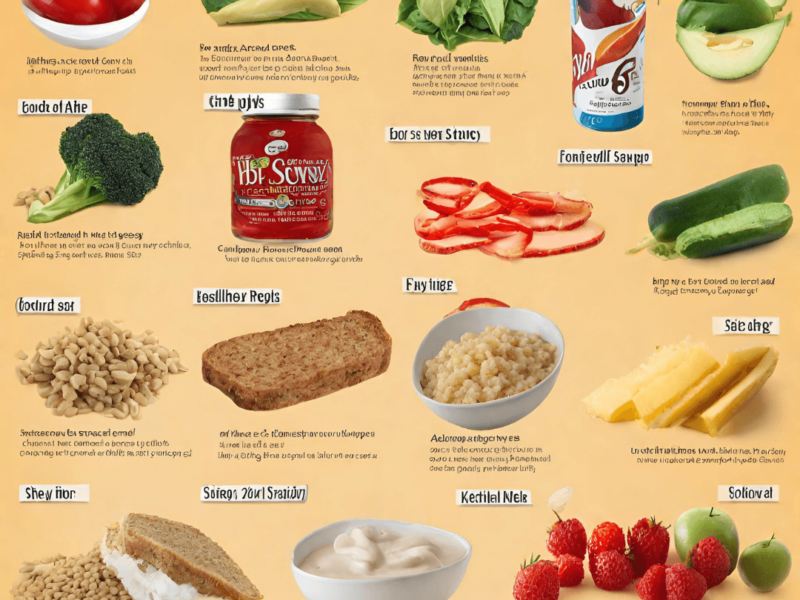
4 Easy Steps to Boost Longevity Through Nutrition, According to a Harvard Expert
Introduction
Longevity, the desire to live a long and healthy life, is a goal shared by many individuals. While genetics certainly plays a role in determining our lifespan, research shows that our diet and lifestyle choices can also have a significant impact. In this article, we will explore the insights of a Harvard expert and discover four easy steps we can take to boost longevity through nutrition.
Step 1: Embrace a Plant-Based Diet
A plant-based diet has been consistently linked to numerous health benefits, including a longer lifespan. According to the Harvard expert, filling our plates with a variety of colorful fruits, vegetables, whole grains, legumes, and nuts can provide us with the essential nutrients our bodies need to thrive.
Why Choose a Plant-Based Diet?
By focusing on plant-based foods, we can benefit from their high fiber content, low saturated fat levels, and rich sources of phytochemicals and antioxidants. These components help reduce inflammation, promote gut health, and protect against chronic diseases such as heart disease, diabetes, and certain types of cancer.
The Role of Fruits and Vegetables
Particular attention should be given to fruits and vegetables as they are packed with vitamins, minerals, and disease-fighting compounds. Aim for a rainbow of colors on your plate to ensure a wide range of nutrients.
Step 2: Prioritize Healthy Fats
Contrary to popular belief, not all fats are bad for us. In fact, our bodies need certain types of fats to function optimally. The key is to choose healthy fats over unhealthy ones.
Include Omega-3 Fatty Acids
Omega-3 fatty acids, found in fatty fish like salmon, sardines, and mackerel, are known to support heart health and reduce the risk of chronic conditions such as dementia and age-related macular degeneration. For those following a plant-based diet, options like chia seeds, flaxseeds, and walnuts are excellent sources of plant-based omega-3s.
Avoid Trans Fats and Saturated Fats
Trans fats and saturated fats, commonly found in processed foods and animal products, can increase the risk of heart disease and other health issues. Be mindful of reading food labels and opt for healthier fat alternatives like avocados, olive oil, and nuts.
Step 3: Watch Your Portion Sizes
In our modern food environment, portion sizes have dramatically increased, contributing to the rising rates of obesity and related diseases. Controlling portion sizes is essential for maintaining a healthy weight and promoting longevity.
Practice Mindful Eating
Eating mindfully involves paying attention to our body’s hunger and fullness cues. By listening to our body and stopping eating when we feel satisfied, we can avoid overeating and improve digestion.
Choose Quality over Quantity
Focus on the quality of the food you consume rather than the quantity. Nutrient-dense foods provide our bodies with vital vitamins, minerals, and antioxidants, ensuring we receive optimal nourishment without excess calories.
Step 4: Stay Hydrated and Limit Sugary Beverages
Proper hydration is crucial for our overall health and longevity. Water supports our bodily functions, helps regulate body temperature, and aids in digestion. In contrast, sugary beverages like soda and fruit juices can contribute to weight gain, diabetes, and other chronic diseases.
Opt for Water and Herbal Teas
Make water your go-to beverage, aiming for at least 8 cups or 2 liters per day. If you crave flavor, infuse your water with fruits or herbs. Herbal teas are also an excellent option, offering hydration and additional health benefits.
Avoid Sugary Drinks
Minimizing the consumption of sugary drinks can significantly improve our health and longevity. These beverages are often high in calories and added sugars, which can lead to weight gain and various health conditions. Choose water or unsweetened beverages as healthier alternatives.
Conclusion
By adopting these four easy steps recommended by a Harvard expert, we can pave the way to a healthier and more fulfilling life. Embracing a plant-based diet, prioritizing healthy fats, controlling portion sizes, and staying hydrated will not only boost our longevity but also enhance our overall well-being.
FAQs
1. Can I still consume animal products on a plant-based diet?
Yes, a plant-based diet does not necessarily exclude all animal products. The focus is on consuming primarily plant-based foods and minimizing the intake of animal-derived products.
2. Are there any specific fruits or vegetables that are particularly beneficial for longevity?
While all fruits and vegetables offer health benefits, certain varieties are especially rich in antioxidants and other longevity-promoting compounds. Examples include berries, leafy greens like kale and spinach, cruciferous vegetables like broccoli and Brussels sprouts, and colorful options like oranges and red bell peppers.
3. How much water should I drink each day?
The recommended water intake can vary depending on factors such as age, sex, physical activity, and climate. As a general guideline, drinking at least 8 cups or 2 liters of water per day is a good starting point for most individuals.
Pedro Porro’s Lone Goal Secures Tottenham Hotspur’s Place in the FA Cup Fourth Round

